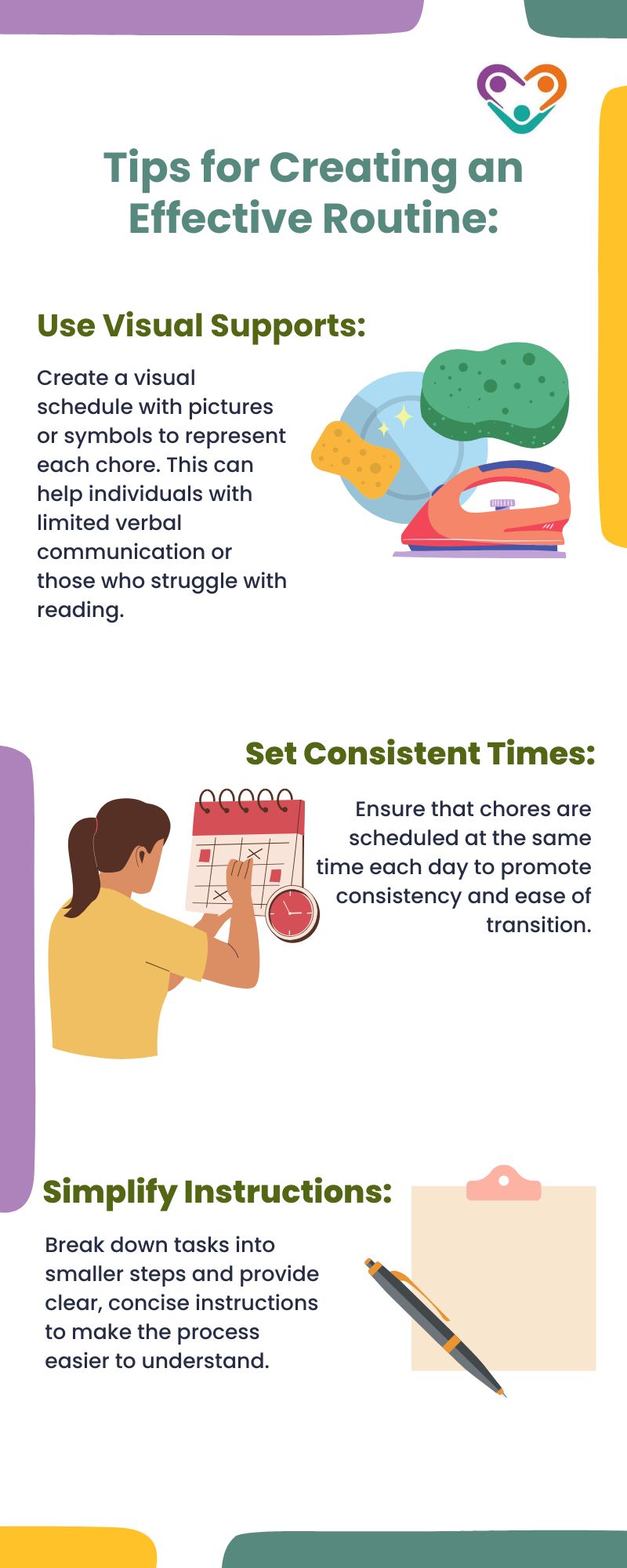Handling household chores can be challenging for anyone, but it may be particularly difficult for individuals on the autism spectrum. Autism can affect various skills such as executive functioning, attention, sensory processing, and social interaction, which can all impact how one approaches daily tasks.
However, with the right strategies, tools, and supports, managing household chores can become a more achievable and manageable task. By focusing on teaching independence, individuals can build essential life skills that foster confidence and self-sufficiency. Without further ado, here are some effective strategies for handling household chores with autism.
Understand the Challenges of Household Chores with Autism
People with autism often face several challenges when it comes to household chores. These challenges may vary widely from one individual to another, but common difficulties include sensory sensitivities, issues with time management, and difficulty following multi-step instructions.
Sensory overload from loud noises, bright lights, or even certain textures can make cleaning or organizing feel overwhelming. Additionally, executive functioning issues such as difficulty planning, prioritizing tasks, and completing them promptly can also hinder progress.
In many cases, individuals on the autism spectrum may also struggle with maintaining focus for extended periods, which can lead to frustration or avoidance of certain tasks. By understanding these unique challenges, it becomes easier to develop strategies that cater to the specific needs of an individual with autism, making household chores more manageable.
Establish Clear Routines
One of the most effective strategies for handling household chores with autism is establishing a clear and consistent daily routine.
People with autism often thrive in structured environments, where tasks are predictable and follow a set pattern. Routines provide a sense of security and help reduce anxiety about what needs to be done next. By creating a visual schedule or checklist, individuals can have a concrete understanding of the sequence of tasks they need to complete and when to do them.
For example, a daily routine might involve a series of simple tasks like making the bed in the morning, putting away dishes after meals, and sweeping the floor in the evening. It is important to break down larger tasks into smaller, manageable steps to avoid overwhelming the individual.
A visual timetable can help individuals with autism stay on track and know exactly what to expect throughout the day.
Here are some tips to consider:

Incorporate Visual Supports and Reminders
Visual supports are powerful tools for individuals with autism, as they can help reinforce memory, organization, and task completion. Using visual reminders, such as checklists or charts, can assist with task management and reduce the need for verbal prompting.
For instance, a chart featuring pictures of different chores (e.g., washing dishes, folding laundry, or taking out the trash) can serve as a constant visual cue for the individual.
Additionally, digital reminders on a phone or tablet can help individuals stay on track with their chores. Setting alarms or notifications for specific times can provide gentle reminders to start or finish a task. By incorporating visual cues, individuals with autism are more likely to stay organized and motivated to complete household chores.
Individuals with autism may also struggle with multitasking or staying focused on one task for an extended period. To make household chores more manageable, it’s important to simplify tasks and implement strategies for time management.
Breaking down each task into clear, achievable steps can prevent frustration and increase the likelihood of success.
For example, rather than assigning a large, overwhelming task like “clean the kitchen,” break it down into smaller steps, such as “wipe down the countertops,” “empty the dishwasher,” and “sweep the floor.” Simplification of tasks also includes limiting distractions and creating a focused environment. If possible, assign a specific area for each chore to avoid switching between tasks.
Positive Reinforcement and Motivation
Motivation can be a barrier to completing household chores, especially for individuals with autism who may not see the task as rewarding. Positive reinforcement is a key strategy for motivating individuals to complete chores. By providing praise or rewards for completing tasks, individuals are more likely to engage in household chores consistently.
Rewards can range from verbal praise to a favorite activity or a small treat. It is important to identify what motivates the individual and tailor the reward system to suit their preferences. A structured reward system can be particularly helpful in reinforcing positive behavior and ensuring tasks are completed.

Involve the Whole Family
For families of individuals with autism, managing household chores can become a shared responsibility. Involving the entire family in household chores not only lightens the load but also promotes social interaction and teamwork.
If possible, family members can work together to complete tasks, with each person helping to model appropriate behaviors for the individual with autism.
Additionally, family members can offer encouragement and support during chore time, providing additional assistance if needed. By making household chores a collaborative effort, the process becomes more social, enjoyable, and less stressful for everyone involved.
Seek Professional Support and Resources
For individuals with autism who face significant challenges with household chores, seeking professional support may be beneficial.
Occupational therapists, behavior analysts, and other autism professionals can provide personalized strategies and interventions to help manage tasks effectively. These experts can work with the individual to develop tailored plans that address specific challenges and build independence over time.
Additionally, there are numerous community resources, support groups, and online tools that can offer helpful advice and guidance for individuals and families. Professionals can help implement interventions that are suitable for the individual’s needs and goals, providing ongoing support and encouragement.
Managing household chores with autism doesn’t have to be an overwhelming task. By implementing clear routines, sensory-friendly strategies, visual supports, and positive reinforcement, individuals on the autism spectrum can successfully participate in daily household tasks.
Simplifying tasks, managing time effectively, and involving family members can further improve the process.
With the right support and tailored strategies, individuals with autism can learn to handle household chores with increased independence and confidence. At Golden Care Therapy, our dedicated ABA therapists in Indiana, New Jersey, New York, Georgia, and Florida work closely with families to create personalized plans that truly make a difference.
We are committed to providing compassionate, high-quality care that fosters meaningful progress in daily life. Reach out to us today to learn more about how we can support your loved one’s journey!



